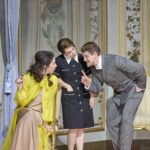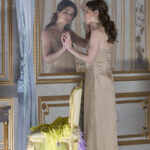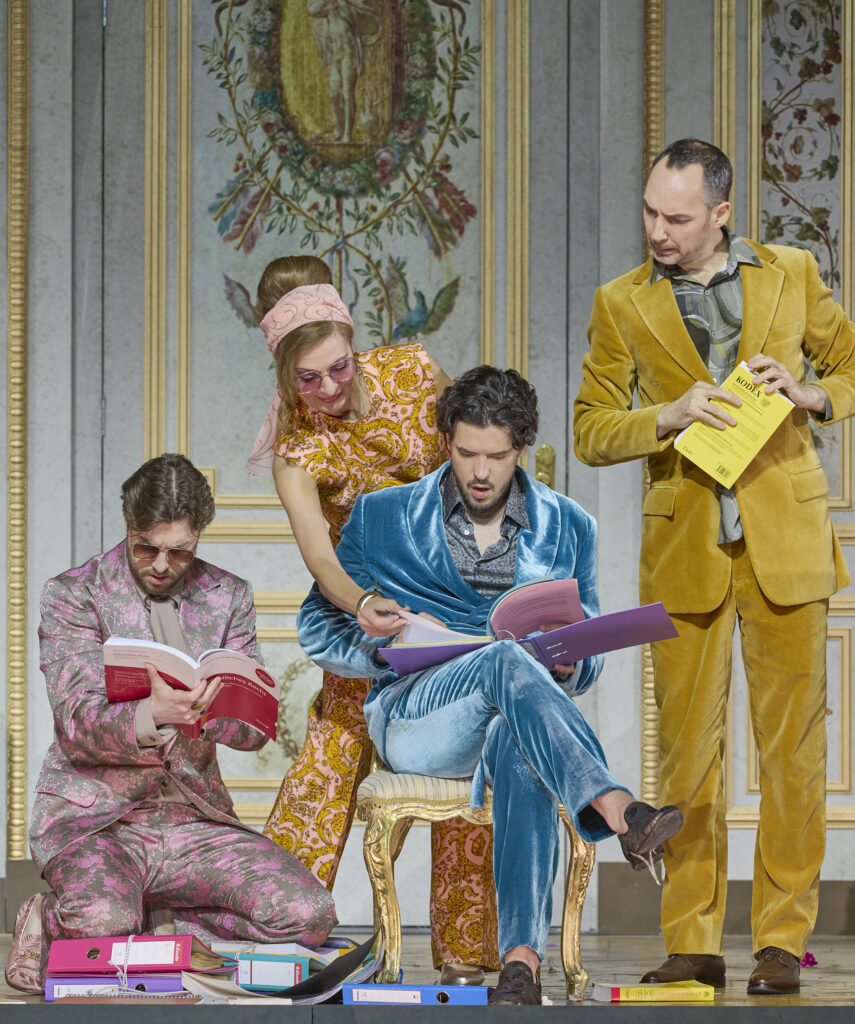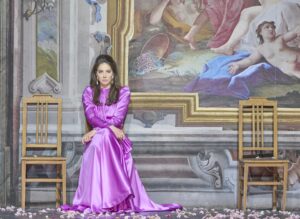Susanna (Maria Nazarova) is dressed as a modern chambermaid in black, tight-fitting uniform. Figaro (Peter Kellner) measures her up- with a tape measure! – but to see if the bed will fit. She’s petite, he’s six foot, and trim-bearded. Behind them, white wood-panelled walls, (this could be a converted baroque palace, a de-luxe hotel in Milan, Paris, or even Seville.) And with call bells. If the Countess calls at night, and she needs me, and Figaro’s away? she asks. Because I am Susanna, and you are a fool!- If the Count tries anything, I’ll, I’ll…..Kellner sings, arms threatening, holding up a broom from her cleaning console, ‘for a trick here, he’ll play a trick there’. The bell rings, and he jumps to attention. Kellner’s stolid bass-baritone, well matched with Nazarova’s coloratura-soprano.
Behind them, white wood-panelled walls, (this could be a converted baroque palace, a de-luxe hotel in Milan, Paris, or even Seville.) And with call bells. If the Countess calls at night, and she needs me, and Figaro’s away? she asks. Because I am Susanna, and you are a fool!- If the Count tries anything, I’ll, I’ll…..Kellner sings, arms threatening, holding up a broom from her cleaning console, ‘for a trick here, he’ll play a trick there’. The bell rings, and he jumps to attention. Kellner’s stolid bass-baritone, well matched with Nazarova’s coloratura-soprano.
Interesting that conductor Jordan is himself playing the harpsichord, Vienna State Opera Orchestra, ‘historically aware’ on modern instruments. Jordan’s lively rhythmic backing drives the comic action.
The costumes (Victoria Behr) are a wow. Dr.Bartolo (Stefan Cerny) in a mustard, satin suit, appears with Marcellina, (Stephanie Houtzeel), quite something, in an orange silk trouser suit, and gold designer glasses. Gorgeous, but she’s supposed to be older: old enough to be Figaro’s mother. But she’s holding Figaro to a marriage pledge, should he default on her loan. (She’s armed with a bright turquoise folder). They know him in Seville: he’ll get that Figaro, sings Cerny’s thrilling baritone.
Marcellina confronts Susanna, her rival for Figaro, ‘How clever, modest, demure’, she mocks her. Houtzeel towers over the housemaid. After you, they bitch.
Cherubino (Patricia Nolz), blonde, in a dusty-pink suit, a stand-out in this star cast, sings how lucky Susanna is to see her mistress morning to night. She grabs a sheet, as if fondling the Countess, ‘she fills me with irrestible longing.’ But ‘every woman makes me tremble, makes me blush.’ Nolz, fantastic mezzo, full-bodied, yet sweet, will sing her own praises if she has to.
The Count enters- Andrè Shuen, ruffled, curly hair- tall, in a violet-patterned dressing gown, bare-chested, virtually naked underneath. He propositions Susanna, but has to hide, ironically where Cherubino’s been eavesdropping.
In walks Basilio (Josh Lovell), in a pink, grey-patterned suit, flared trousers, talking about Cherubino’s exploits. So out springs a raging Almaviva. Susanna feigns a fainting fit: carried by Almaviva and Basilio, ‘your honour is safe with us.’ Throw the philanderer out! Cherubino is still hiding under that sheet, (hangíng on the wall panel.) Cherubino is hunched up, in a foetal position; like a frightened mouse. Hitherto, everything Almaviva’s heard about him was only a suspicion.
The wedding guests arrive- a multi-coloured carnival. ‘We scatter flowers before our noble lord’. Almaviva (still in his silk dressing gown) publicly renounces his seigneural pre-nuptial rights.
Figaro looks imposing in a silk grey DB suit, black patent shoes, definitely prima. No longer will he, Cherubino, ‘wear those fine feathers, and disturb the peace of fair madame.’ The Count holds up a rifle, and there’s a troupe of beautifully turned-out soldiers, in silver-grey hose, and turquoise waistcoats. Poor Cherubino, centre-stage, is cowering beneath the rifles pointed at him.
(In the Countess/Susanna intrigue, Almaviva opens Figaro’s forged letter of a meeting between the Countess and ‘alleged lover’. And Susanna is to ask the Count to a night-time garden rendezvous…)
Cherubino, dressed as a new recruit, addresses, ‘You ladies who know what love is’. He sings, with multiplicated irony, ‘what he feels is all new to him.’ But this sublime aria is sung, by Nolz, a cross-dressed, woman mezzo-soprano. Then, on his knees to his beloved Countess. Cherubino’s young soldier is now undressed (by Susanna): into her frilly corset, stockings, gold, high-heeled satin shoes; and loses his balance. So Nolz’s Cherubino, cross-dressed, caresses the Countess; they’re getting it on. Then in strides the Count.
Unlocked out of Susanna’s closet, Cherubino jumps out of the window! Almaviva, to descending hapsichord, about to open the closet- there’s a loud sneeze in the opera stalls!! -demands the key. And to Count and Countess’s astonishment, Susanna creeps out, innocently brushing a wig.
 Almaviva, bemused, has to beg forgiveness, (but who wrote the letter?) The gardener Antonio (Wolgang Bankl, his belly bursting out of his braces), arrives with a bouquet of roses, (from where a man jumped.) So was it Figaro, who’s hopping around? Under Kosky’s brilliantly pacey direction, they’ve played two hours without a break.
Almaviva, bemused, has to beg forgiveness, (but who wrote the letter?) The gardener Antonio (Wolgang Bankl, his belly bursting out of his braces), arrives with a bouquet of roses, (from where a man jumped.) So was it Figaro, who’s hopping around? Under Kosky’s brilliantly pacey direction, they’ve played two hours without a break.
Act 3, a palatial state room, beautiful wall paintings on classical themes. Almaviva, depressed, in his aria, everyone is plotting against me. Shuen, in a fabulous sage brocade jacket, apple-green shirt, Behr has raided the cat-walks. Eye-watering. Whereas Nazarova’s still prim in a servant’s uniform. ‘And if you lose your beloved on your wedding day?’- Heartless woman, why did you let me pine so long?- A woman takes her time.- My heart’s exploding, he proclaims. – She, such is the nature of love. They clinch, but ‘the Countess is waiting for her salts.’
Alone, Shuen freaks, I’ll punish you; does a somersault; and lies on the stage floor. Shuen’s aria is excellent: he’ll use every means. Is he meant to suffer, while his servant is happy? She, to be married to a common knave? After she’s rejected him!
Then, in Da Ponte’s brilliant, cynical libretto- hilarious, played so stylishly as here- the posse of ‘lawyers’. Figaro must pay up, or marry Marcellina. The gathering is like a super-celebs divorce court. But it turns out Figaro, a ‘foundling’- marked by ‘noble birth’- was abducted. Marcellina, calls to ‘her Rafaelo’, she’s his mother.
By contrast, comedy’s flip-side, the Countess plans to get even with the Count. ‘What a humiliating position her husband’s put her in’. She sings feistily, ‘First he loved me, then insulted me, then betrayed me!’ To the refrain, ‘what happened to those wonderful moments’. Müller, wearing a white chiffon gown, her lament, plaintively sung.
‘What a humiliating position her husband’s put her in’. She sings feistily, ‘First he loved me, then insulted me, then betrayed me!’ To the refrain, ‘what happened to those wonderful moments’. Müller, wearing a white chiffon gown, her lament, plaintively sung.
The wedding is spectacular. Susanna, in white satin, sings, ironically, What a soft breeze will waft this evening. Ladies in pale blue – bleached blondes all, including Cherubino – bless the Countess, (in sexy, violet silk).
Yet another costume change! Shuen, in black velvet, sitting alongside the Countess, but distanced. The servants are lined up, Almaviva scowling. ‘It’s always the same with women’, (the misogyny of the age.) Yet he’s on his knees searching for the pin to the incriminating ‘billet-doux’ arranging his rendez-vous with Susanna.
The gloomy set (Act 4) counters the brilliantly lit, fast-paced comedy of Act 3. The pitch-black stage framed by white strip-lighting. In the farce, Susanna’s Countess teases Figaro, boxes his ears; and the Count meets his own wife for sex, disguised as Susanna.) But Almaviva spies the ‘Countess’- actually Susanna – with Figaro. Figaro sings bitterly, it’s madness to trust women.
Muller’s actual Countess reveals herself in black, Shuen on his knees begs forgiveness. She, more understanding, answers yes. ‘Then let us all be happy’. Stirring chorus- ‘hasten to the festival’- but ironic. The Alamavivas only problematically reconciled, their mood is penitent.
Kosky’s production was a triumph, a balance between modern costumes against classically-themed stage sets. The audience clearly enjoyed themselves. I can’t wait for more of Kosky’s Mozart/Da Ponte series. © P.R. 19.3.23
Photos: Maria Nazarova (Susanna), Peter Kellner (Figaro); Hanna-Elisabeth Müller (Countess), Maria Nazarova (Susanna), Peter Kellner (Figaro); Hanna-Elisabeth Müller (Countess) © Michael Pöhn/Wiener Staatsoper


